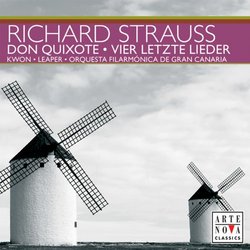| All Artists: Strauss, Orquesta Filarmonica de Gran Canaria Title: Don Quixote & Vier Letzte Lieder (Jewl) Members Wishing: 1 Total Copies: 0 Label: Arte Nova Classics Original Release Date: 1/1/2010 Re-Release Date: 3/9/2010 Genre: Classical Styles: Historical Periods, Classical (c.1770-1830) Number of Discs: 1 SwapaCD Credits: 1 UPC: 723721455453 |
Search - Strauss, Orquesta Filarmonica de Gran Canaria :: Don Quixote & Vier Letzte Lieder (Jewl)
 | Strauss, Orquesta Filarmonica de Gran Canaria Don Quixote & Vier Letzte Lieder (Jewl) Genre: Classical
Don Quixote was premiered unsuccessfully in Paris in 1900. At that time Romain Rolland, who later helped Strauss with the French libretto to Salome (Op. 54), remarked in his diary that the public "choked in its outrage ...... more » |
Larger Image |
CD Details
Synopsis
Album Description
Don Quixote was premiered unsuccessfully in Paris in 1900. At that time Romain Rolland, who later helped Strauss with the French libretto to Salome (Op. 54), remarked in his diary that the public "choked in its outrage ... they couldn't take any humor." This work, which looks back to Franz Liszt but also forward to the future, found no friends in the great city on the Seine--despite (or perhaps precisely because of) its progressive aspects. Strauss's tone poem is an expression of "truly poetic content" through "music alone," depicting the figure of Don Quixote in the form of 10 "fantastic" variations, framed by an introduction and epilogue. It may be seen almost as a "character-like" sketch of the life of that literary knight. Richard Strauss's Vier letzte Lieder (Four Last Songs, 1948) represent his swan song in this genre. Based on texts by Joseph von Eichendorff and Hermann Hesse, the music displays that wonderfully free melodic line, backed by evermore rich and detailed orchestral writing, of the kind that the young Strauss had sought after many years before. In terms of content, the songs mirror the composer's sorrow over the destruction of his homeland during the madness of the recent war, and they also celebrate the composer's lifelong love for his wife and his sentiments at the approach of death. (text by Sven Koblischek)

 Track Listings (16) - Disc #1
Track Listings (16) - Disc #1